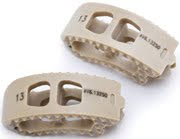FKuR Introduces Bioplastics for Film & Injection Molding Applications at K2010
Coinciding with the K 2010, bioplastics manufacturer FKuR Kunststoff GmbH has extended its product range to include more innovative products. The company is presenting them at the show in hall 6, booth B66. Shrink film applications: Predominantly based on renewable resources, Bio-Flex® F 4110 can be processed into film on conventional LDPE extruders. The properties required for shrink films can be adjusted by using this grade in combination with other Bio-Flex® F types in a multilayer structure. "Due to the innovative combination of raw materials and multilayer structures, films made from this material show excellent shrink qualities and tightening strength," says Patrick Zimmermann, Director - Sales and Marketing, KKuR. Bio-Flex® F 4110 is a compostable raw material corresponding to EN 13432 with a renewable resource content greater than 60%. Thermoforming and injection molding needs: Based on PLA and PBS, Bio-Flex® S 5630 is a compound with a high re

